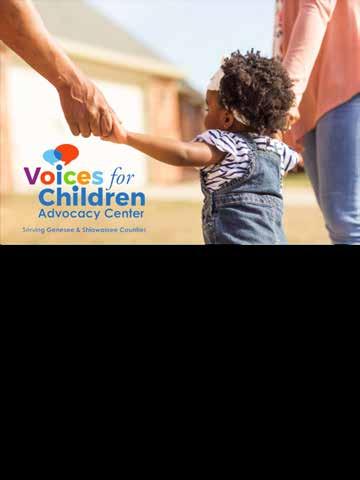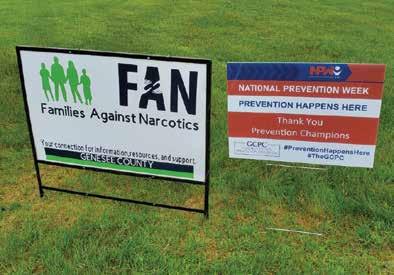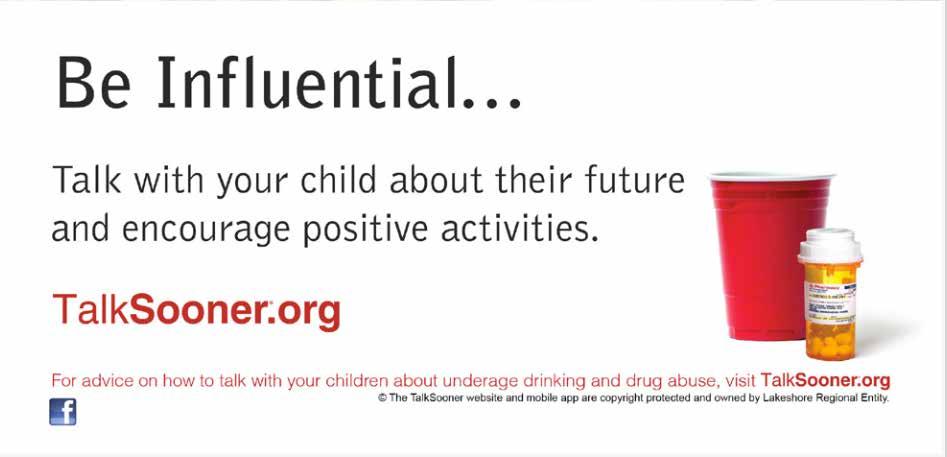
20 minute read
Helping Children Learn from Their Mistakes
HELPING CHILDREN
learn from their mistakes
By LEN LANTZ, MD
HAS YOUR CHILD EVER BROKEN A BIG RULE?
There are some situations that no parent wants to deal with. It can be very embarrassing for you and your child when they are in trouble. I consider breaking a big rule to mean that your child: • Shoplifted/stole • Started a physical fight that didn’t involve protecting themselves or someone else • Did drugs or sold drugs • Got suspended from school • Bullied someone relentlessly • Attacked you or a member of your family or engaged in very serious physical threats • Missed curfew or ran away for days or weeks • Skipped school routinely • Engaged in high-risk behavior When you learned about their behavior, what started running through your mind? Like many parents, you might have thought: • “Is this how I raised them?” • “Is this what our family stands for?” • “Do they believe this is right?” • “Is this what their music, video games and friends are teaching them? In your heart, you hope that the answer to every one of the above questions is no. If the answer to any of the above questions is yes or if you don’t know all the answers, then you might have a lot of work to do in finding answers and hopefully stopping repeated rule-breaking behavior.
AN EPISODE DOES NOT EQUAL A PATTERN
I think it’s reasonable to point out that if your child breaks a big rule, it does not necessarily mean that they are doomed to repeat the same mistake. Most parents understand this by instinct. There are many ways to handle a child’s first-time big rule violation. It can be hard to know how to handle it because it is outside your previous parenting experience. Some parents lead with the mother-of-all groundings, which backfires as often as it is effective. Other parents go the route of humiliating their kids.
One of the worst strategies used by parents is shaming and ridiculing their children, often by reciting rules, which is the equivalent of saying, “You’re stupid.”
One of the most effective parenting strategies to use when dealing with your child’s big first-time offense is to get more information. Listen to every one of the excuses they have to offer. I’m not kidding. Ask questions designed to get more specific details without shaming or blaming. Expect some lies at the start, so take written notes and let them know that you are willing to contact every person who knows about the situation to confirm their version of events. Learn as much as you can about their experience, because for a substantial number of kids, getting caught is the greatest punishment. What did they go through, especially when they were caught? What was it like for them?
PRESCRIPTION DRUG WORKGROUP


I F Y O U A R E C O N C E R N E D A B O U T T H E I M P A C T O F T H E O P I O I D C R I S I S A N D P R E S C R I P T I O N D R U G M I S U S E , E S P E C I A L L Y A M O N G Y O U N G P E O P L E , P L E A S E J O I N U S T O W O R K O N E F F E C T I V E S T R A T E G I E S .


Be a Voice for Children
Voices for Children is dedicated to preventing child abuse in Genesee & Shiawassee Counties. Join our FREE community prevention trainings covering a wide range of topics including:
Child Abuse & Neglect Child Sexual Abuse Prevention Children's Advocacy Centers Human Trafficking Infant Safe Sleep LGBTQ+ Youth Advocacy Mandated Reporter Training Online/ Internet Safety Problematic Sexual Behaviors Shaken Baby/ Abusive Head Trauma
Learn more about Voices for Children Advocacy Center's Services request a training today trainings@voicesforcac.org voicesforcac.org (810) 238-3333

Popcorn lung (aka, bronchitis obliterans) is caused by a chemical called diacetyl, which is commonly found in flavored vaping juices. The chemical causes inflammation, scarring and constriction of the bronchioles. The constriction causes loss of lung function and can be fatal.
Exposure to diacetyl may cause stinging or burning in the eyes, skin irritation or rash, dry cough, shortness of breath and sore throat. The disease is irreversible. In severe cases, patients may be placed on a lung transplant waiting list.
"Popcorn" Lungs

continued from page 7
Ask them if there is anything else they want you to know. Are there any more details they want to share? In everything they say, make sure to listen for the apology. “I’m sorry” actually counts as an apology in Kid World. Read back to them what happened and what their experience was. Ask them if there are any details that they want to change or that they think they didn’t get quite right. When they are completely done and have let it all out, tell them, “I hear you.”
Then, ask them if they are ready to hear about what you experienced regarding their big mistake. If they say yes, then start immediately. If they say no, then let them know you will share your experience with them tomorrow. Share with your child: “When I heard about (or experienced) your mistake…
My biggest fear was _________.
My most powerful emotion was _________.
My strongest thought was _________.
My initial reaction was to _________ (big consequence), but I don’t believe I should base my decisions only on my initial reaction.
That was a big mistake. I believe in you and that you can learn from this mistake.
We’ll talk about your consequence tomorrow (or let’s talk about your consequence now).”
HOW DO OUR CHILDREN LEARN OUR VALUES?
We teach our values to our children in several ways. The things I’ve listed below, individually or in combination, are some of the most common ways kids see what we believe in. Our children are watching and studying us as often as we are them. If you have a pattern of saying one thing and doing the opposite, expect and accept your child someday calling you out on it. Values are communicated in:
Sayings:
• “In our family, we stand up for each other.” • “We take care of each other.” • “We can disagree and still love and respect each other.” • “Everyone makes mistakes. The best thing we can do is learn from them.”
Traditions:
• Eating meals together. • As a family, serving a meal at a homeless shelter. • Donating goods to a charity. • Saying grace at a meal.
Earning/spending money:
• “We donate money to this cause because it is one way for us to stand up for what we think is just and right.” • “I don’t make much money at this job, but it is meaningful to me.” • “This job is not what I would like to be doing, but it allows me to provide better for our family.”
Going against herd thinking:
• “I didn’t see that going to college would help me get the job I wanted to do.” • “I believe spending huge amounts of money at Christmas is not the best way to say, ‘I love you.’”
Education/service:
• Pursuing advanced educational degrees. • Serving in the Peace Corps. • Serving in the military. • Doing public service.
Volunteering/advocacy:
• What do you do that you don’t get paid for? • What or whom do you stand up for?
Relationships/friendships:
• With whom do you surround yourself? • Do you want your children to be like your friends?
Spiritual practices:
• Attending religious services. • Practicing meditation. • Praying together. Your children, especially as they get older, start to fill in the above categories on their own. Do you know how your child would fill in the value categories above? Teenagers especially are frequently trying out different ideas and figuring out what they like and what they reject. They are forming their own individual identities and while most have no desire to be a clone of their parents, parents are the first and usually the most powerful influence on kids as they develop their own values.
IT IS IMPORTANT TO MODEL YOUR VALUES AS YOU HELP YOUR CHILD THROUGH THEIR BIG MISTAKE
Your success or failure at maintaining your cool and modeling the values you hold will influence your child’s acceptance or rejection of your values – especially in the times when they are most vulnerable, such as when they make a major mistake. Helping your child through this is an opportunity to demonstrate what you believe. 1. Own it: At some point, kids need to acknowledge that they made a mistake. Period. Until kids take personal ownership of their behavior, including their mistakes, they are going to have a hard time with the subsequent steps, which are critical to their development and forming healthy relationships. 2. Fix it: Determine what needs to be done to make amends. Depending on what happened, this may involve much more than a genuine apology. Working to undo a mistake that they made can help kids feel absolved from guilt or shame they may have about their behavior. 3. Deal with the fallout: There may be additional consequences even though kids have worked to make amends for their behavior. There may be a loss of privileges at home and there may also be consequences outside of the home, such as legal, work or school consequences. 4. Learn from it: People commonly repeat mistakes unless they take the time to review the factors involved with their behavior and what changes could have resulted in a different outcome. Figuring out how not to repeat a mistake is incredibly valuable and can turn an episode that feels a bit traumatic to a child into an important learning moment in life. What can you do if you are scared about the direction your child is going? One of the best places to start when you are worried about your child’s choices and behavior is to spend more time with them. That doesn’t mean spending more time delivering sermons and lectures. It means spending more quality time with them. For more information on what that looks like, please read my article, “Special Time – the Most Fun You’ll Have as a Parent.”
YOU CAN HELP YOUR CHILD THROUGH THEIR BIGGEST MISTAKES AND IMPROVE YOUR RELATIONSHIP ALONG THE WAY
Kids make mistakes – sometimes big ones. How you handle it can help your relationship with them and help you to understand why they did what they did. Many parents want their kids to adopt their values and continue their traditions. While kids vary in terms of what they accept and what they reject, especially as they move through adolescence and develop their individual identities, parents are often the greatest influence on kids’ values. You can demonstrate your values to your kids as you help them through some of the toughest times in their lives. How you handle these situations will have a tremendous impact on them and may help further instill your values in them . ■
ARTICLES AND BOOK REVIEWS AT LENLANTZ.COM: “Special Time – the Most Fun You’ll Have as a Parent.• “Creatively Stopping Your Kids’ Disrespectful Behavior” • “Changing Your Force Point by Eliminating Bad Habits in Parenting” • Raising an Emotionally Intelligent Child: The Heart of Parenting by Dr. Gottman • Between Parent and Child by Dr. Ginott • How to Talk So Kids Will Listen and Listen So Kids Will Talk by Faber and Mazlish
Check out who’s standing out in our community.
IS THERE SOMEONE YOU’D LIKE TO NOMINATE?
Please email mlinder@thegcpc.org and tell us why this individual has stood out in your crowd.
Morgan Goodman Morgan is our newest Prevention Specialist at the GCPC! Morgan was born and raised in Genesee County area. She has an associate degree in Criminal Justice from Mott Community College and a Bachelor of Science in Applied Psychology with a minor in Substance Prevention and Treatment from the University of Michigan-Flint. Morgan is currently pursuing a master’s degree in Psychology with a concentration in Applied Behavior Analysis (ABA). She has been a Registered Behavior Technician (RBT) since April 2016 and has been working in ABA since 2015, working with children, adolescents, and adults. Morgan also has been working in experiential education since June 2014, working with students K-12th grade and corporate groups on professional development skills, focusing on communication, trust, integrity, problem solving, and conflict resolution.
Leah Johnson On an adventure to find her spark, Leah discovered public health and made her way here to the GCPC. Leah is a Certified Health Education Specialist serving as an AmeriCorps Opioid Prevention VISTA tasked with growing capacity within our organization. Leah returned home to Genesee County after graduating with a BS in Public Health from Western Michigan University. She is planning to pursue a Master’s degree program in the fall. In her spare time, she assists with other AmeriCorps projects focused on blight removal and Flint neighborhood clean-ups. Leah has assisted on SNAP-Ed research for Van Buren County Health Department, interned with Prevention Works of Kalamazoo, and adapted youth prevention programming materials to increase cultural inclusivity. Leah also studied abroad in South Africa to explore their healthcare systems.
Voices For Children Advocacy Center Voices For Children Advocacy Center is one of the many organizations that the GCPC partners with on prevention efforts. Voices for Children believes that while it is important to protect children who need help today, it is equally important to protect other children from harm in the first place. That is why Voices for Children also focuses on prevention. Prevention wears many faces and must occur in many places to be effective. Their website has free prevention resources, trainings, and tools for parents, kids and educators. Voices for Children also offers a variety of services for children including child and family therapy. Visit www.voicesforcac.org/prevention to access these resources!
Genesee Health Systems Genesee Health Systems (GHS) and the GCPC partner together often to tackle prevention issues that face our communities. GHS is Genesee County’s public mental health provider and has provided services to Genesee County residents for more than 50 years. GHS takes positive action to promote hope and health by recognizing the interconnectedness of the body, the mind, and the community. They do this by drawing out and strengthening the natural systems of support inherent to all communities so that individuals achieve the lives they desire. GHS uses a relationship-based model of care to empower the people they serve and all members of our community to be the drivers of their own health and wellness goals. Visit www.genhs.org to learn more!
Genesee Intermediate School District The Genesee Intermediate School District (GISD) are long standing partners with the GCPC and prevention advocates. GISD provides educational leadership that impacts instruction, learning, student achievement, productivity, and efficiency. Strong relationships and partnerships are the foundation of GISD’s services. It is through those relationships and partnerships that GISD is able to provide high quality, innovative educational programs and support services to students, parents, and educators. The GISD are collaborators, leaders, educators, and service providers. It is through the knowledge, unique skills, and talents of GISD staff, and the collaborative support of stakeholders, that delivery of our programs and services are achieved, and our most important role - service to students - is accomplished. Visit www.geneseeisd.org to learn more!
J O I N T H E G E N E S E E C O U N T Y P R E V E N T I O N C O A L I T I O N ' S UNDERAGE DRINKING PREVENTION WORKGROUP
I F Y O U A R E C O N C E R N E D A B O U T T H E I M P A C T O F U N D E R A G E D R I N K I N G A N D T H E U N I N T E N D E D C O N S E Q U E N C E S , P L E A S E J O I N U S T O W O R K O N E F F E C T I V E S T R A T E G I E S .
Whatever you call it, it's still marijuana

The bottom line is just because marijuana is legal doesn ’t mean that it isn ’t harmful! Many harmful substances, including alcohol and cigarettes, are available to the public. Many negative effects of marijuana don ’t show up until later in life. Any kind of smoking causes lung damage, and marijuana smoke is just as harmful as nicotine smoke. More immediately, marijuana can influence mood disorders like anxiety and depression, which can affect performance in school and sports.
40 DEVELOPMENTAL ASSETS
40 Developmental Assets are essential qualities of life that help young people thrive, do well in school, and avoid risky behavior.
Youth Connections utilizes the 40 Developmental Assets Framework to guide the work we do in promoting positive youth development. The 40 Assets model was developed by the Minneapolis-based Search Institute based on extensive research. Just as we are coached to diversify our financial assets so that all our eggs are not in one basket, the strength that the 40 Assets model can build in our youth comes through diversity. In a nutshell, the more of the 40 Assets youth possess, the more likely they are to exhibit positive behaviors and attitudes (such as good health and school success) and the less likely they are to exhibit risky behaviors (such as drug use and promiscuity). It’s that simple: if we want to empower and protect our children, building the 40 Assets in our youth is a great way to start.
Look over the list of Assets on the following page and think about what Assets may be lacking in our community and what Assets you can help build in our young people. Do what you can do with the knowledge that even through helping build one asset in one child, you are increasing the chances that child will grow up safe and successful. Through our combined efforts, we will continue to be a place where Great Kids Make Great Communities.
Turn the page to learn more!
The 40 Developmental Assets® may be reproduced for educational, noncommercial uses only. Copyright © 1997 Search Institute® , 615 First Avenue NE, Suite 125, Minneapolis, MN 55413; 800-888-7828; www.search-institute.org. All rights reserved.
assets in action 40 DEVELOPMENTAL ASSETS
4
Odyssey House of Flint supporting National Prevention Week

38 18
Matthew Like, YAB member A’mari Allen-Johnson, 15 y/o, school football game
8
Tomas Tello, Youth Advisory Board, filming GCPC advertising video

SUPPORT
1. Family support: Family life provides high levels of love and support. 2. Positive family communication: Young person and her or his parent(s) communicate positively, and young person is willing to seek advice and counsel from parent(s). 3. Other adult relationships: Young person receives support from three or more nonparent adults. 4. Caring neighborhood: Young person experiences caring neighbors. 5. Caring school climate: School provides a caring, encouraging environment. 6. Parent involvement in school: Parent(s) are actively involved in helping young person succeed in school.
EMPOWERMENT
7. Community values youth: Young person perceives that adults in the community value youth. 8. Youth as resources: Young people are given useful roles in the community. 9. Service to others: Young person serves in the community one hour or more per week. 10. Safety: Young person feels safe at home, at school, and in the neighborhood.
BOUNDARIES & EXPECTATIONS
11. Family boundaries: Family has clear rules and consequences and monitors the young person’s whereabouts. 12. School boundaries: School provides clear rules and consequences. 13. Neighborhood boundaries: Neighbors take responsibility for monitoring young people’s behavior. 14. Adult role models: Parent(s) and other adults model positive, responsible behavior. 15. Positive peer influence: Young person’s best friends model responsible behavior. 16. High expectations: Both parent(s) and teachers encourage the young person to do well.
CONSTRUCTIVE USE OF TIME
17. Creative activities: Young person spends three or more hours per week in lessons or practice in music, theater, or other arts. 18. Youth programs: Young person spends three or more hours per week in sports, clubs, or organizations at school and/or in the community. 19. Religious community: Young person spends one or more hours per week in activities in a religious institution. 20. Time at home: Young person is out with friends “with nothing special to do” two or fewer nights per week.
If you or your child would like to submit a picture that represents one of the 40 Developmental Assets, please email mlinder@thegcpc.org with a picture and the number of the asset the picture represents.
Not all pictures are guaranteed publication.
7
COMMITMENT TO LEARNING
21. Achievement motivation: Young person is motivated to do well in school. 22. School engagement: Young person is actively engaged in learning. 23. Homework: Young person reports doing at least one hour of homework every school day. 24. Bonding to school: Young person cares about her or his school. 25. Reading for pleasure: Young person reads for pleasure three or more hours per week.

POSITIVE VALUES

26. Caring: Young person places high value on helping other people. 27. Equality and social justice: Young person places high value on promoting equality and reducing hunger and poverty. 28. Integrity: Young person acts on convictions and stands up for her or his beliefs. 29. Honesty: Young person “tells the truth even when it is not easy.” 30. Responsibility: Young person accepts and takes personal responsibility. 31. Restraint: Young person believes it is important not to be sexually active or to use alcohol or other drugs.
SOCIAL COMPETENCIES
32. Planning and decision making: Young person knows how to plan ahead and make choices. 33. Interpersonal competence: Young person has empathy, sensitivity, and friendship skills. 34. Cultural competence: Young person has knowledge of and comfort with people of different cultural/racial/ethnic backgrounds. 35. Resistance skills: Young person can resist negative peer pressure and dangerous situations. 36. Peaceful conflict resolution: Young person seeks to resolve conflict nonviolently.
POSITIVE IDENTITY
37. Personal power: Young person feels he or she has control over “things that happen to me.” 38. Self-esteem: Young person reports having a high self-esteem. 39. Sense of purpose: Young person reports that “my life has a purpose.” 40. Positive view of personal future: Young person is optimistic about her or his personal future.

Families Against Narcotics preparing for National Prevention Week
17 39
Tomas Tello, 17 y/o, DJ’ing at a community event
10
William Fockler, Youth Advisory Board, doing what he loves, playing baseball
DEA Takeback Day deposit box in community





